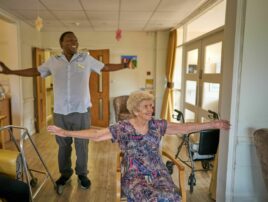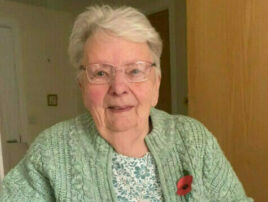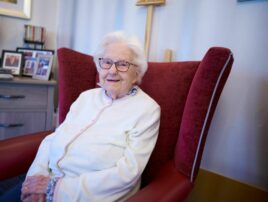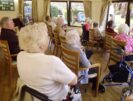
Monday 13th May 2024
Can a bra stuffed with tennis balls help prevent heart failure and dementia?
Louise Morse
It was an odd headline that caught my eye recently, but one that makes sense when you read the article. Shakespeare’s Macbeth described sleep as ‘the Balm of hurt minds, sore labour’s bath…’ and centuries later research shows that during sleep, the brain’s hemispheres shrink and channels between them widen to drain away toxins that build up during waking hours. Quality of sleep affects a person’s cognitive health, the brain’s capacity to think, learn and memorise things. Chronic sleeplessness in midlife raises one's risk of dementia, especially if you have a very common sleep disorder, obstructive sleep apnoea (OSA). This is where the tennis balls come in.
‘A good laugh and a long sleep are the best cures in the doctor’s book,’ says an old Irish proverb. Sleep is an essential component of optimal health and function. However, poor sleep habits and insufficient sleep are endemic in modern society, often because of modern lifestyle, work patterns, poor mental health, technology and alcohol consumption. Average sleep duration in the population has progressively shortened over recent decades, and a UK study of over 2000 participants found that 37 percent reported difficulties with their sleep. A difference has been found between people who are early birds and those who are late risers. Researchers in Korea found that early risers require five to six hours of sleep, while those who wake up later need seven to eight hours.
All sleepers are susceptible to obstructive sleep apnoea, OSA, but particularly men who are overweight. It usually happens when people are sleeping on their backs and the muscles and soft tissues in the throat relax and collapse sufficiently to cause a total blockage of the airway. When the airflow is blocked for 10 seconds or more it’s called an apnoea. During an episode, the lack of oxygen triggers your brain to pull you out of deep sleep – either to a lighter sleep or to wakefulness – so your airway reopens and you can breathe normally. This can happen more than 20 times a night - and symptoms include snorting, grasping and breathing pauses, although you may not even notice it. They’re usually first spotted by a family member who notices problems while you sleep. But because it affects the way your brain is programmed to work at night, the following day you may experience symptoms, like morning headache, and trouble focusing at work.
Around 25 percent of middle-aged Britons are affected but less than 5 percent of people with OSA have been diagnosed or treated, which is worrying, as it’s linked to type II diabetes and heart disease. Now new research from the Boston Medical Centre in the US has shown that it’s linked to memory or thinking problems. In a study about sleep quality and brain function with more than 4000 people, people with apnoea symptoms were 50 percent more likely to report memory or thinking problems. And a review of studies published in 2022 in the Journal of Sleep Research, found that people with OSA were 28 percent more likely to have dementia. OSA may interfere with our brains ability to forge new connections during sleep, which is vital for laying down new memories. The NHS website lists conditions that can give rise to OSA, and says you should visit your GP if you think you have it .
In his newspaper column Dr Michael Moseley says that losing weight might help, ‘as can sewing a tennis ball into the back of your pyjamas to stop you rolling onto your back.’ One of his readers told him he sleeps wearing his wife’s bra on backwards with a tennis ball in each cup. ‘He said it felt a bit peculiar to start with, but it’s effective. No word yet on what his wife thinks.’ She’d probably be pleased to know it was helping reduce the risk of developing dementia.
More from Pilgrims' Friend Society

Meet a Hummingbird... Susan >
As a Hummingbird at Shottermill House, Susan provides practical, emotional and spiritual support to our family members

10 skills and qualities you need to be a carer >
Caring has been unfairly labelled by some as a low-skilled role. Our Operations Manager Jane Trimarco highlights the skills and qualities that show it’s anything but

Lucy shares the vision for Christians in Care >
Lucy Honeysett, Lead Coordinator of Christians in Care, shares why she’s passionate about leading this initiative


































